
TL;DR
- UAE law now requires limited-term contracts for all private-sector employees.
- Employers must follow rules on work hours, leave, salary payments, and termination.
- Gratuity must be paid after one year of service based on a clear formula.
- Violations can lead to fines, service suspensions, and legal trouble.
- Compliance includes WPS registration, Emiratisation targets, and safe workplaces.
Running a business in the UAE comes with opportunity but also responsibility. One of the most critical responsibilities for employers is staying compliant with UAE employment law. Slip up on these rules, and you could face fines, fights, and a bruised reputation. Hiring or growing? Play it smart from the start.
The UAE government has made its labor framework clearer and more modern than ever before. With the introduction of Federal Decree Law No. 33 of 2021 (amended in 2022 and 2023), employers now have structured, predictable guidelines to follow. This blog covers a range of topics, including core provisions and contract types, employment termination law in the UAE, probation periods, and gratuity payouts, enabling you to confidently navigate the UAE’s employment rules and maintain business compliance.
What is UAE Employment Law?
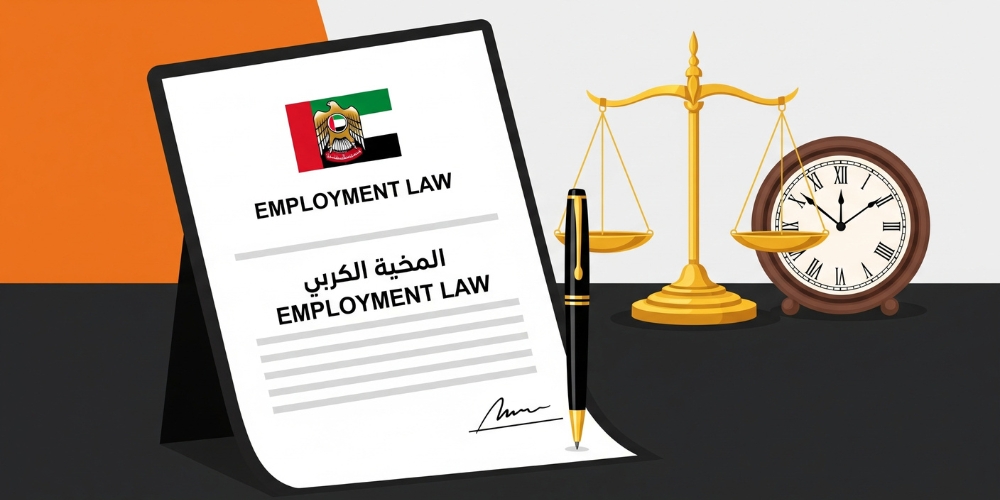
UAE employment law is the rulebook that governs the relationship between private-sector employers and employees; think of it as the playbook for maintaining fairness, legality, and smooth operations. The current law, Federal Decree-Law No. 33 of 2021, came into effect on February 2, 2022, replacing the earlier 1980 labor law (Federal Law No. 8 of 1980). Built to bring labor rules up to speed with global standards, UAE employment law aims to maintain fairness, flexibility, and a future-ready approach. It touches just about every part of work life, including:
- Hiring and onboarding
- Working hours and overtime
- Leave entitlements
- Termination and end-of-service benefits
- Anti-discrimination and harassment protections
The recent legal update now requires all employees to be hired under limited-term contracts instead of the previously used unlimited ones. This is to be done to create clearer expectations and a more consistent structure in how employment relationships are managed.
Employers were required to switch to limited-term contracts by February 2023, following rules set in Ministerial Resolution No. 27 of 2023. Those who didn’t risk facing penalties.
This law applies across all seven Emirates and is separate from the DIFC and ADGM free zone employment regulations, which follow their own legal frameworks based on common law principles.
Pass or Violation? Test Your Knowledge of UAE Employment Law
Scenario 1: An employer terminates a worker during their probation period without providing a 14-day notice.
Scenario 2: An employee is hired on a limited-term contract lasting exactly 3 years.
Scenario 3: A company refuses to pay gratuity to an employee who resigns after working for 2 years.
Who Does UAE Employment Law Apply To?
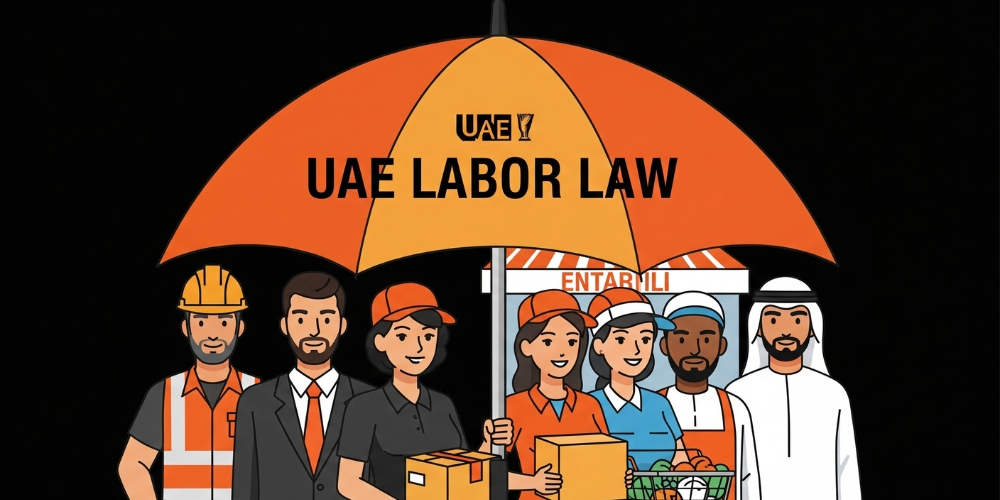
Employment law in the UAE generally applies to the majority of individuals working in the private sector, along with the companies that employ them, across the country, although there are some exceptions.
Covered by UAE Labour Law:
- All private-sector employees outside of free zones
- UAE nationals and expatriates
- Full-time, part-time, temporary, and flexible workers
This includes domestic workers, although a separate law governs them: Federal Law No. 10 of 2017 on Domestic Workers.
Not Covered by UAE Labour Law:
- Employees in free zones like DIFC or ADGM (they follow their own rules)
- Federal government employees
- Local government employees in each Emirate
- Armed forces, police, and security personnel
Still, if you’re hiring in mainland UAE or in a non-financial free zone (e.g., JAFZA, DAFZA), you’re bound by UAE employment law and need to comply fully. This also ties in with wider workforce policies like the Nafis Program, which continues to reshape national hiring priorities.
Also worth noting: with the latest updates, the UAE has placed stronger emphasis on protecting worker rights, including anti-discrimination laws based on race, gender, religion, and nationality.
Key Provisions of UAE Employment Law
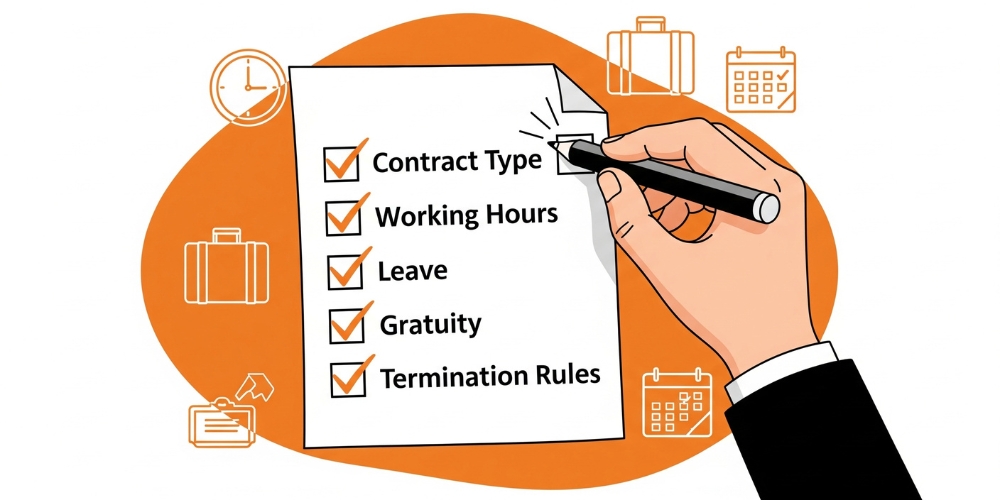
To stay on the right side of the rules in the UAE, you’ve got to get familiar with the key parts of UAE employment law. It’s the playbook for hiring and managing teams smoothly.
1. Types of Employment Contracts
The law now says: no more open-ended “see how it goes” contracts. Every employment agreement needs a clear start and end date. So, think of it like a Netflix subscription, but for jobs (up to 3 years, and yes, you can renew). Gone are the days of juggling between limited and unlimited contracts. Now, it’s one clean, structured way forward for everyone.
This change simplifies employment structures and reduces ambiguity around end-of-service benefits and notice periods. Still confused about the old vs. new system? Don’t worry, our FAQ later in this article will walk you through it.
2. Working Hours and Overtime
UAE labour law sets the standard workweek at 8 hours a day, 48 hours a week. But during Ramadan, everyone gets a breather as hours drop by two each day.
Put in extra time? You’re not working for free. Overtime kicks in with bonuses:
- 125% of your basic pay for regular extra hours
- 150% if you’re burning the midnight oil between 10 p.m. and 4 a.m.
3. Leave Entitlements
The law spells out your time-off rights loud and clear, covering all kinds of leave you might need:
- Annual leave: 30 calendar days after a year on the job; that vacation is yours
- Sick leave: Up to 90 days a year, with different pay levels depending on how long you’re out
- Parental leave: New moms and dads each get 5 paid days within 6 months of welcoming a baby
- Maternity leave: 60 days total, 45 fully paid, 15 at half pay (hello, baby bonding time)
- Compassionate and study leave: Available for Emirati employees when life or learning calls
4. Gratuity and End-of-Service Benefits
When it’s time for an employee to move on, UAE employment law gratuity requirements kick in, and they’re a big deal. If someone’s been with you for at least a year straight, they’ve earned a farewell payout based on their final basic salary:
- 21 days’ pay for each year of service during the first five years
- 30 days’ pay for each year beyond that
There’s just one catch: if the employer fires the employee for serious misconduct, they may not have to pay the benefit. Otherwise, it’s the law—thank you and goodbye, with a proper send-off.
5. Employment Termination Protections
UAE labor law employment termination protections are in place to ensure that no one is unfairly dismissed. If an employer wants to end a contract, they’ve got to:
- Give proper written notice (at least 30 days)
- Stay away from biased or random firings
- Settle everything owed: unused leave, gratuity, the works
Match the Key UAE Employment Provisions
Drag each term on the left to the correct description on the right.
Employer Obligations Under UAE Law

Employers must run their business efficiently while following UAE employment rules that protect employee rights. Here’s what you need to do by law:
1. Register Employees with MOHRE
Within 14 days of hiring, all employees must be registered with the Ministry of Human Resources and Emiratisation (MOHRE) and the General Pension and Social Security Authority (for Emirati workers). Registration accuracy is essential, especially for national workers who require GOSI enrollment for benefits. This includes issuing:
- A formal labour contract
- Health insurance
- Work permit and Emirates ID
2. Adhere to Probation Period Employment Law in UAE
If asked, “What is the probation period employment law in the UAE?”, probation can last a maximum of 6 months. During this time:
- Employers may terminate without standard notice requirements (with a 14-day written notice)
- Employees leaving must give one month’s notice if they plan to join another UAE company, or 14 days if leaving the country.
3. Provide Fair Compensation and Timely Payment
Salaries must be paid through the Wages Protection System (WPS), a government-monitored platform that ensures wage transparency. Late or missed salary payments can result in:
- Warnings
- Suspension of new work permits
- Fines
4. Implement Anti-Discrimination & Harassment Policies
Creating a fair, respectful workplace is the law. Article 4 makes it crystal clear: no discrimination allowed based on things like:
- Gender
- Race
- Color
- Nationality
- Religion
- Disability
Ignore complaints or fail to enforce these rules, and you could be looking at lawsuits and fines that go all the way up to AED 1 million. So, keep it inclusive and handle issues seriously.
5. Provide Safe Work Environments
A safe workplace isn’t a bonus. It’s a legal must. Employers need to tick all the right boxes when it comes to:
- Fire safety plans that aren’t just for show
- Workspaces that don’t wreck your posture
- Proper gear (PPE) for jobs that get risky
Penalties for Non-Compliance

Ignoring UAE employment law is risky. Let’s find out why:
1. Fines
Fines start at AED 5,000 and climb all the way to AED 1 million. It all comes down to what went wrong and how many people got pulled into the chaos. Here are a few classic blunders that tend to cost big:
- Hiring without a valid work permit? That’s AED 50,000 per worker
- Paying salaries late? Be ready for AED 5,000–AED 50,000
- Didn’t switch contracts to a limited-term by the deadline? That’s AED 5,000 per case
2. Suspension of Services
Companies that fail to comply may have their MOHRE services (like work permits) suspended for up to 6 months or more. This directly affects recruitment and expansion plans.
3. Criminal Liability
Cross the line with serious offenses, think forced labor, human trafficking, or repeat violations, and it’s not just fines you’ll be facing. Business owners and HR heads could end up in court, behind bars, or even on the next flight out of the country.
4. Civil Liability & Employee Claims
When things go south with a termination, the fallout can get expensive. Under employment termination law in UAE, if an ex-employee files a complaint and wins, the employer could be on the hook for:
- Up to 3 months’ salary in compensation
- Any unpaid wages or benefits
- Gratuity owed
- Even claims for emotional distress
5. Reputational Damage
A labor dispute or lawsuit doesn’t just stay behind closed doors. It can stick to your brand like glue, especially when you’re trying to stand out in a crowded job market.
Penalty Risk Simulator: Estimate Your Exposure
Estimated Penalty Exposure:
Recent Changes and Updates (2024–2025)
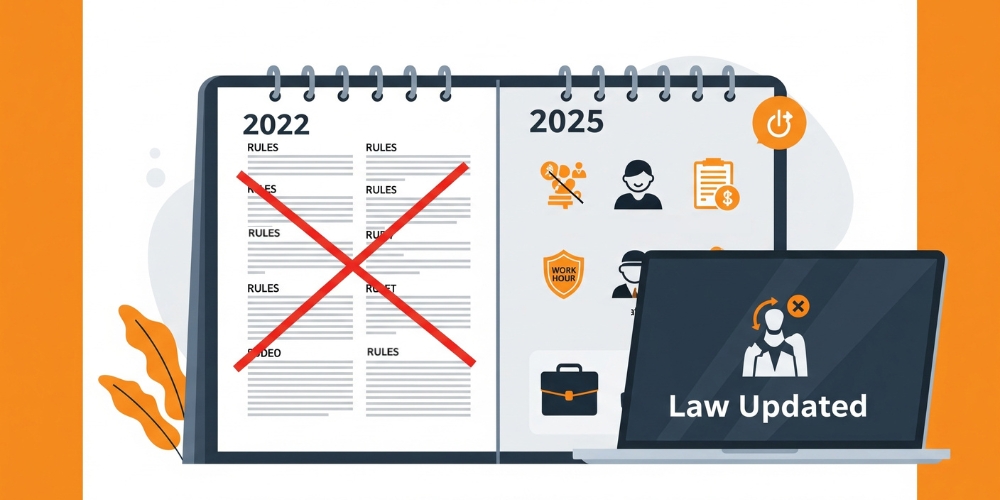
The UAE employment law continues to evolve, enhancing protections for both employers and employees:
Federal Decree-Law No. 9 of 2024 (effective August 31, 2024)
- It is now a requirement for employers to continue salary payments for up to two months during labor disputes. This ensures financial stability for employees while issues are being resolved.
- Probation termination notice must be at least 14 days, aligning with standards on notice periods during early employment.
Contract Flexibility and Fixed-Term Focus
- The move to fixed-term contracts (maximum 3 years) is further affirmed, with 95% of UAE businesses compliant by 2024.
- Previously, optional renewal clauses are now common, giving both parties greater clarity around extension terms.
Gratuity Enhancements
- Employees are now guaranteed end-of-service gratuity, regardless of resignation or cause of termination. There’s no longer a cap at two years’ wage for gratuity payouts in some free zones (like ADGM).
- Mainland practice remains, ensuring all employees earn 21 days’ pay per year for the first 5 years, and 30 days beyond; plant removal of forfeiture remains intact.
Worker Protection & Health Updates
- The midday work ban for outdoor workers (12:30–15:00, June 15–Sept 15) continues, with 99% compliance across sectors.
- Employers must now include pay statements, detailing wages and deductions, for transparency.
Emiratisation Push
- Private-sector firms with 50+ staff were required to meet a 1% Emiratisation target by July 1, 2025, with incentives and penalties tied to compliance. Companies often face setbacks due to avoidable policy mistakes, which can easily be prevented with the right HR planning and clarity on Nafis expectations.
How to Ensure Compliance
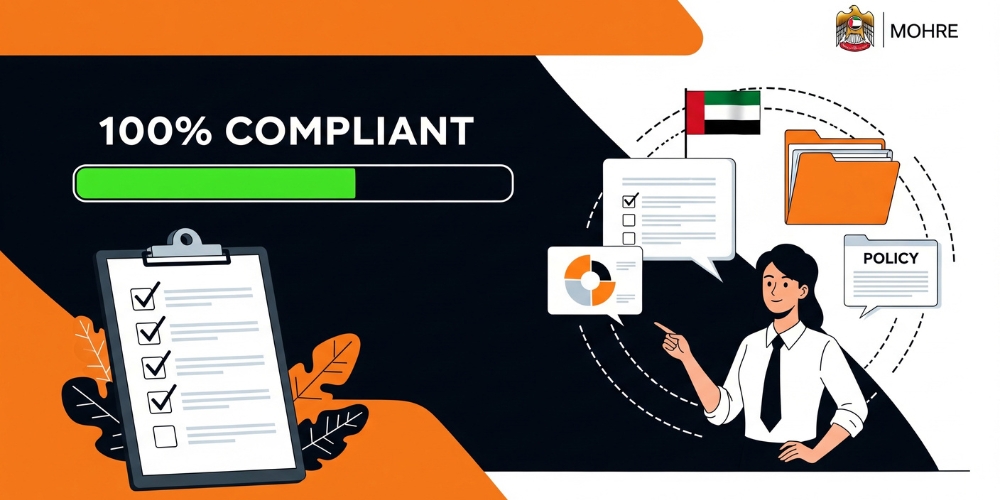
Here’s a checklist to help employers stay aligned with employment law UAE:
- Update Contracts and Policies
- Move to contracts that are fixed-term with a maximum duration of 3 years.
- Include notice periods, dispute resolution, and renewal clauses.
- Track and Document Everything
- Use MOHRE’s systems for WPS salary uploads, MOHRE registration, and work permits.
- Provide pay slips with detailed breakdowns each payroll cycle.
- Use MOHRE’s systems for WPS salary uploads, MOHRE registration, and work permits.
- Monitor Regulatory Deadlines
- Adopt the midday outdoor work ban during summer.
- Ensure Emiratisation compliance if you have ≥50 employees.
- Adopt the midday outdoor work ban during summer.
- Regular Training for HR and Management
- Topics: wage protection, probation, termination rights, anti-discrimination, and health & safety.
- Topics: wage protection, probation, termination rights, anti-discrimination, and health & safety.
- Strengthen Gratuity and Termination Processes
- Apply the correct 21/30 days formula for end-of-service benefits. Don’t cap payouts arbitrarily.
- Archive gratuity payouts and ensure payment within 14 days of termination.
- Apply the correct 21/30 days formula for end-of-service benefits. Don’t cap payouts arbitrarily.
- Plan for Labor Disputes
- Budget for up to two months’ salary continuation in case of disputes.
- Set up internal and MOHRE grievance resolution methods.
- Budget for up to two months’ salary continuation in case of disputes.
- Focus on Mental Models and Culture
- Promote non-discrimination and safety.
- Create a simple process for complaints and whistle-blowing.
- Promote non-discrimination and safety.
Conclusion
Following UAE employment rules shows your team and the world that you’re serious about doing things the right way. When you stay up-to-date on new regulations and treat your employees with fair means, you avoid fines as well as build a company people actually want to work for. A motivated team comes from creating an environment where people are respected and supported. That’s when real progress happens.
FAQs: UAE Employment Law
Limited-term (fixed-term) contracts clearly state start and end dates and can be renewed. UAE law requires all contracts to be limited-term, up to 3 years.
Unlimited contracts, phased out post-2022, did not define an end date, causing ambiguity over notice periods and benefits.
Under UAE employment law gratuity rules:
- <1 year service: No gratuity.
- 1–5 years: 21 days’ basic salary per year.
- >5 years: 30 days’ salary per year beyond first 5.
Total should not exceed two years’ salary (mainland), and gratuity cannot be forfeited regardless of termination method.
Example: An employee earning AED 10,000/month, with 7 years’ service, gets 21×5 + 30×2 = 165 days = AED 54,500.
Covers private sector employees across mainland UAE. Includes full-time, part-time, flexible, domestic workers (under separate law), and expatriates.
Excludes: Employees in DIFC/ADGM free zones, federal or local government, armed forces, police, and security personnel.




